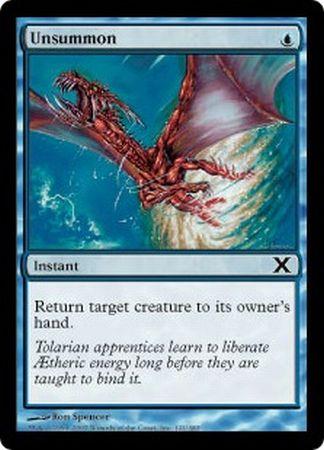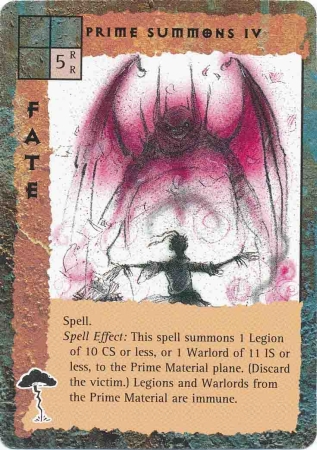Abjure
(Abjuration)
(esreveR = Implore, Conjuration/Summoning)
<original txt says reversible, no =>

Abjure
(Abjuration)
(esreveR = Implore, Conjuration/Summoning)
<original txt says reversible, no =>

|
|
|
|
|
|
|
|
|
|
|
|
|
|
|
|
|
|
Effect: When a Priest employs a
spell of this sort,
he or she is attempting to return a creature
from another plane of existence to its own plane.
The exact name of the type of creature
to be affected by the abjure spell must be known.
If the creature also has a specific (proper)
name, then that too must be known and used.
The naming cleric then compares his or
her level against the level or hit dice of the creature under abjuration,
in the same way that the success of a
[dispel magic] spell is determined
(base 50% chance of
success, plus or minus the level/HD difference between the caster and the
creature to be affected).
The percent chance for success is then
compared to a percentile dice roll.
If the roll is equal to or less than the
chance to abjure,
the creature is instantly sent back to
its own plane.
In all other cases the spell fails.
(The creature might not wish to remain
on the caster's plane, and in such a case it could be appreciative of the
cleric's attempt to return it to its home.)
Neither version of this spell will function
upon deities,
but might affect servants or minions thereof.
<repeated text>
MC: The material components for
an abjure spell are a holy/unholy symbol, holy or unholy water,
and often some material inimical to the creature.
Shukenja: A shukenja may return
an extra-planar being to its native plane by this spell.
The shukenja must know the exact and proper
names of the being so affected.
Success is determined as for a dispel
magic, comparing the caster's level and the creature's hit die.
Shukenja.Implore: The spell's reverse,
implore,
can summon a specific creature, of the same alignment as the shukenja,
from another plane.
Success is the same as for the abjure,
and the exact and proper names of the creature must be known.
The implore does not restrain a
summoned creature, and neither version affects deities or demi-gods.
Shukenja.MC: The material components
for both versions include the holy symbol of the shukenja and holy water.
The abjure also uses same material
inimical to the creature,
while the implore uses any substance
the creature craves or respects.
Implore
(Conjuration/Summoning)
(esreveR = Abjure, Abjuration)
<original txt says reversible, no =>

|
|
|
|
|
|
|
|
|
|
|
|
|
|
|
|
|
|
Effect: The esrever of this spell,
implore,
entreats some like-aligned creature from
another plane to come to the cleric casting the spell.
Success must be determined just as if
abjure
had been CAST. <add a little text here, in the sense of : ie. etc. etc.
?> <prespos: wtf are you talking about, again?>
In like vein,
the spell caster must know the
exact name of the type of creature as well as its given Name,
if any.
If the implore spell succeeds,
the cleric has absolutely no guarantee
that the creature summoned from another plane will be favorably disposed
to him or her.
Neither version of this spell will function
upon deities,
but might affect servants || minions thereof.
MC: In reversed form,
the material components are the same except
for the last,
which must be something that the implored
creature craves or respects.
<link the save field to appro. text>
<does the % roll replace a save, or
is it in addition to a save? my guess = the latter>
*template***template*